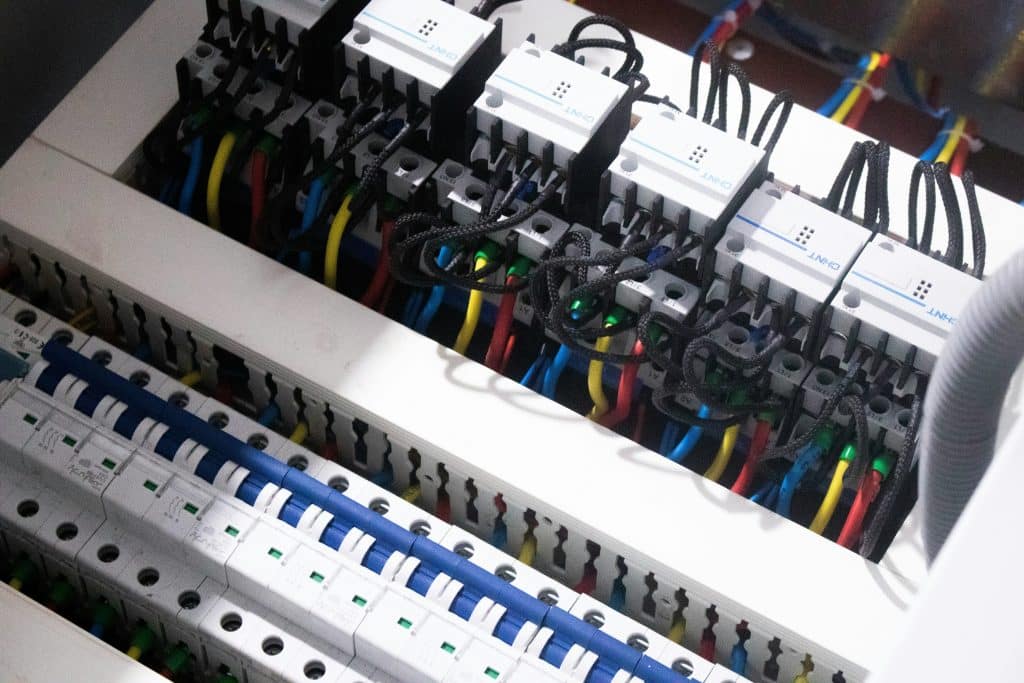Electrical engineering
Specialty
Engineering
Degree
Bachelors
Language
English Language
Duration
4 years
Summary
Electrical engineering is an engineering discipline that focuses on the study and application of principles of electricity and electronics in various applications. It is considered an important field in the current era, as it plays a crucial role in improving technology and advancing various industries. The role of electrical engineering revolves around the design and development of electrical power systems, communication systems, electronic devices, renewable energy, and many other fields. Thanks to these diverse applications, electrical engineering contributes to the development and improvement of systems and technologies that have a significant impact on daily life and various industries.
In addition, electrical engineering plays a vital role in areas such as sustainable energy and climate change solutions, where it works on developing new techniques to use energy more efficiently and reduce harmful emissions. Thus, electrical engineering contributes to building a sustainable and environmentally friendly future.

Roles of an Electrical Engineer
The role of an electrical engineer in engineering projects is essential to ensure their efficient and professional implementation. It requires performing a set of necessary tasks that contribute to the success of the project as a whole. Among the most important of these tasks are:
- Designing electrical systems for buildings and facilities using design software such as AutoCAD Electrical and others.
- Taking into consideration the specific requirements of each project and ensuring their compliance with industrial standards, regulations, and safety.
- Being responsible for selecting suitable electrical materials and equipment that conform to standard work specifications.
- Supervising the implementation of electrical installations and ensuring that they are carried out as required according to approved plans.
- Conducting necessary tests to ensure the quality of electrical installations.
- Dealing with any technical or execution problems that arise during project stages and finding quick solutions to them.
- Regularly communicating with the other engineering team, contractors, and clients to ensure smooth project implementation.
- Using the latest techniques and innovations in the engineering field to improve project execution.
Skills and Abilities Required for Studying Electrical Engineering
The student must be capable of understanding and solving mathematical problems effectively.
The student should have a good understanding of fundamental subjects related to electrical engineering, such as physics and chemistry.
- Applying mathematical rules and equations to solve practical engineering problems.
- Working in the field of electrical engineering requires the ability to deal with unexpected problems and find innovative and effective solutions.
- The student should be able to communicate effectively with other members of the engineering team and collaborate with them in problem-solving and achieving common goals.
- The student should be able to write engineering reports correctly to document their work and exchange information effectively with the rest of the team.
- Therefore, the student must have the ability to lead and manage the team effectively.
- The student should be able to learn and use computer programs used in the field of electrical engineering.
- Working in the field of electrical engineering requires attention to detail and effective work under time pressure and deadlines.
- The student should be interested in keeping up with developments and innovations in the field of electrical engineering and leveraging them in their work and skill development.

Coursework for Electrical Engineering
- Mathematics
- Analytical Engineering
- Physics
- Electric Circuits
- Electronics
- Signal Processing
- Basics of Digital Control
- Power Systems
- Digital Control Techniques
- Renewable Energy
- Electric Power
- Renewable Energy Sources
- Wireless Communication Techniques
- Control Systems Study

Advantages of Studying Electrical Engineering in Georgia:
Georgia offers several advantages that make it a distinct destination for studying electrical engineering for students from various countries, especially Arab students. Some of the advantages include:
- Georgian universities offer excellent academic programs in the field of electrical engineering.
- Providing a wonderful and advanced learning environment.
- Georgian universities provide modern technological facilities to facilitate the learning process.
- The educational environment in universities encourages interaction and exchange of experiences between students and professors.
- Availability of many job opportunities in various fields such as renewable energy, technology, and manufacturing.
- Low cost of education compared to other European countries.
- Cultural and social diversity, allowing students to meet new friends.
- Encouragement of research and innovation in the field of electrical engineering,
- providing opportunities for participation in research projects.

Top Universities for Electrical Engineering in Georgia
- Tbilisi State University
- Tbilisi Technical University
- Ilia State University
- Georgian University
- Black Sea University
Ethics Required for an Electrical Engineer:
- Honesty and transparency in all aspects of work.
- Awareness of the important role and representation of the engineer in society.
- Striving to provide engineering solutions that contribute to improving life.
- Compliance with industrial standards and local regulations in designing electrical projects.
- Constantly staying updated with the latest technological advancements in the field of electrical engineering.
- Interacting with colleagues with high ethical standards and collaborating with them to achieve common goals.
- Utilizing critical thinking in problem-solving and utilizing research and analysis skills.
- Adhering to safety guidelines in designing electrical systems.
Source: What Is Electrical Engineering
Opportunities
Job opportunities for graduates:
- Scientific research
- Academic work
- Control engineering
- Maintenance engineering
- Electrical network engineering
- Electronics engineering
- Renewable energy engineering
- Engineering consulting
- Manufacturing of medical equipment and machinery
Universities Table
| # | List of universities | Cost | Enroll |
|---|

